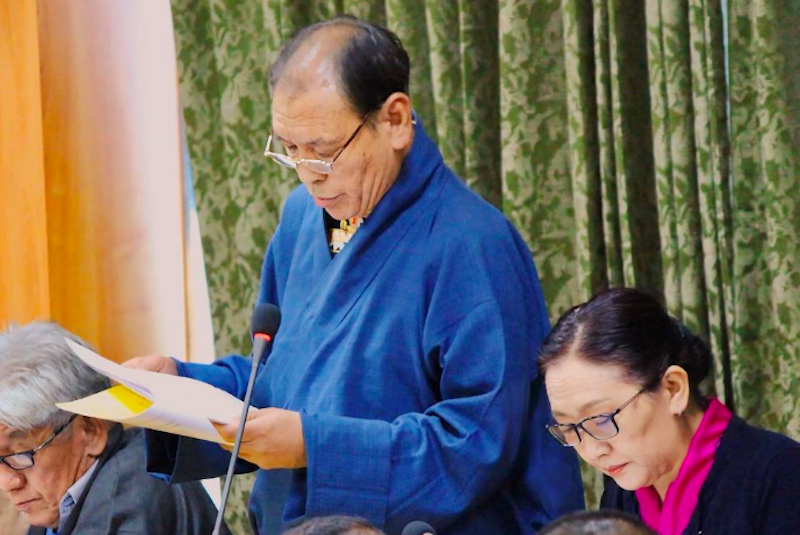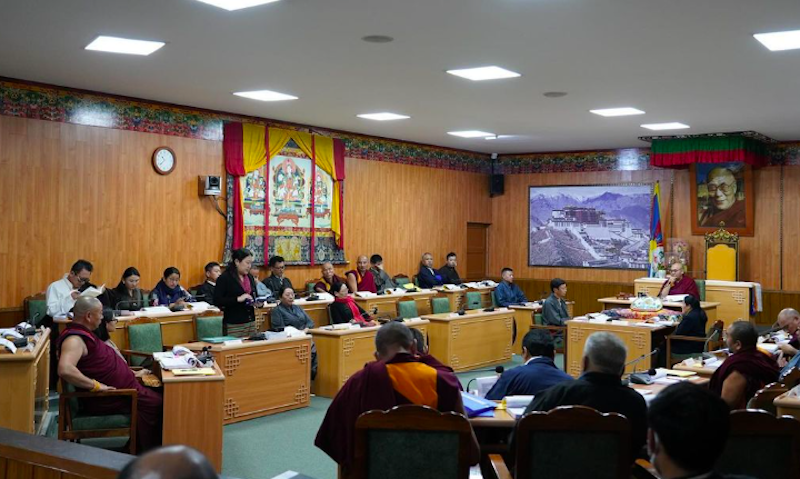By Tsering Dhundup
DHARAMSHALA, March 25: Ahead of the much anticipated proceedings for amendments in the charter of the Tibetan government in exile, the house committee on amendment submitted its report to the parliament on Monday, during the ongoing budget session.
On Tuesday, Tibetan lawmakers will engage in discussions and possibly vote on the proposed amendments which include changes to the oath-taking procedures of the heads of CTA democratic pillars and the appointment of Tibetan Justices.
Speaking to the media, MP Dawa Phunkyi, the Chairperson of the Rules and Regulation Review Committee, expressed confidence in the ongoing process of amending the charter. Phunkyi highlighted the committee’s diligent efforts in soliciting inputs from various stakeholders, including the general public and fellow parliamentarians. “We have made efforts to make amendments in the charter, taking into account suggestions from both the general public and fellow parliamentarians,” stated Phunkyi. “I am optimistic that the amendments will be passed in the parliament.”
Phunkyi further elaborated on the collaborative nature of the amendment process, noting that the committee had received three suggestions from the Speaker and Deputy Speaker of the parliament. “Based on these inputs, along with our amendments, I believe that, aside from minor wording adjustments, the proposed amendments will be successfully passed”.

The senior MP further stated, “The most important charter amendment that is needed is to revise the qualifications required for the appointment of the Chief Justice and the other two justices.” “This amendment holds particular importance as it sets the groundwork for the oath-taking provision,” Phunkyi explained. “We have also put forward recommendations for alternative methods of administering oaths of office. However, the ultimate decision rests with the parliament, and we must await their deliberations.”
The genesis of the ongoing issue traces back to March 2021 during the 10th and final parliament session of the previous Tibetan Parliament in Exile, where the house voted out the Chief Justice and two Commissioners of the Tibetan Supreme Justice Commission (TSJC). Many observers have characterized the move as undemocratic, with some labelling it a “constitutional crisis.”
Following the introduction of a historic motion, the 41 MPs present voted with a 31-10 majority to remove Chief Justice Commissioner Sonam Norbu Dagpo, Justice Commissioner Karma Damdul, and Justice Commissioner Tenzin Lungtok. The Speaker of the Tibetan Parliament in Exile Pema Jungney, who led the initiative, stated it was necessary to safeguard the charter.
The parliament and the apex Tibetan court have locked horns since the TSJC issued a Suo moto ruling in September 2020, citing Article 69 (IX) of the rules of the Supreme Justice to penalize the standing committee of the parliament over the failure to conduct the 10th session due to Covid-19 restrictions. The parliament contested the Suo moto ruling, asserting that the court lacks jurisdiction over its internal proceedings.
Efforts to amend the Charter for the appointment of the vacant position of Chief Justice Commissioner have since encountered repeated setbacks in the parliament. Without a resolution to the matter, future leaders will encounter legal obstacles in assuming their respective positions, presenting a significant challenge to the overall governance of the exiled Tibetan government.
During the sixth session of the 17th Tibetan Parliament-in-Exile in September last year in Dharamshala, a group of nearly 500 Tibetans from the Indian sub-continent and overseas appealed to lawmakers to enact necessary amendments in the Charter, including one allowing the appointment of the Chief Justice Commissioner and two judges of the Supreme Justice Commission, the apex judicial body of the Central Tibetan Administration.










